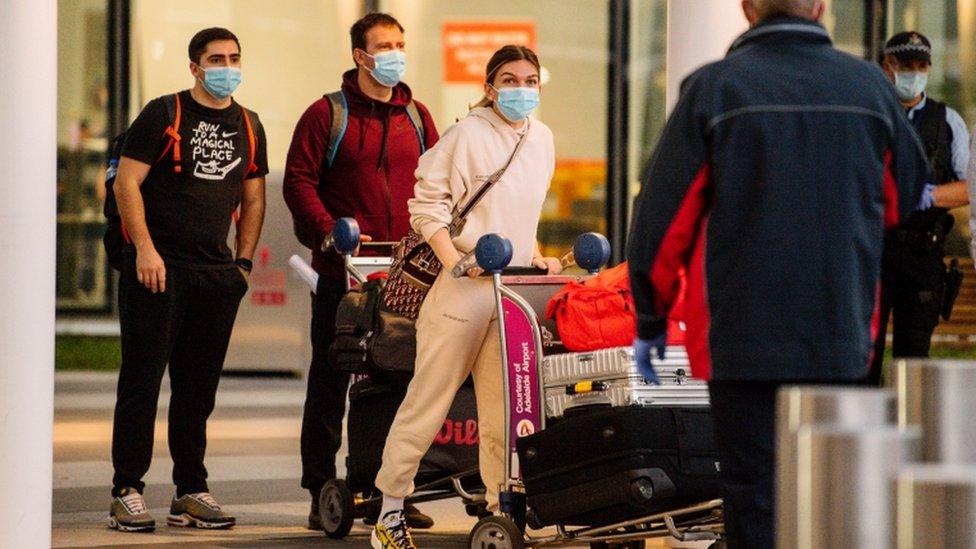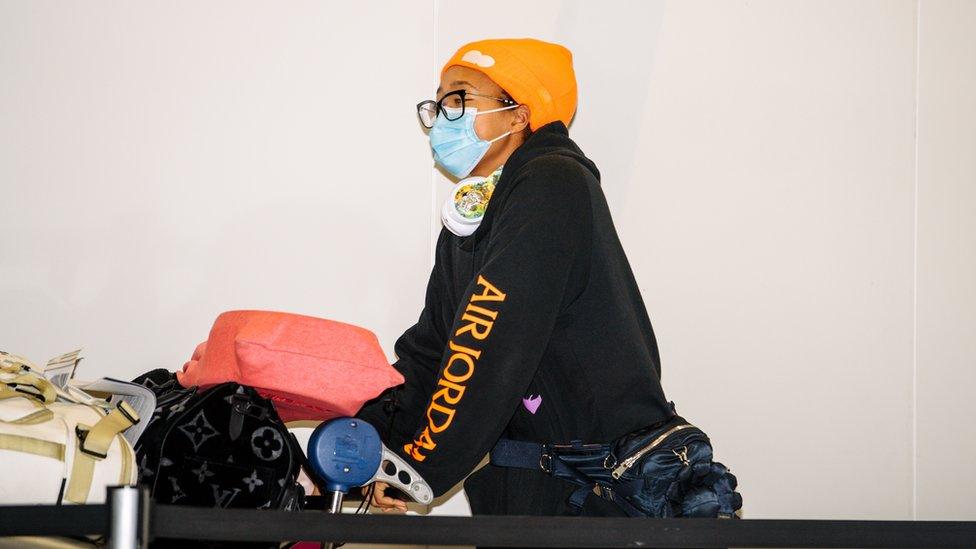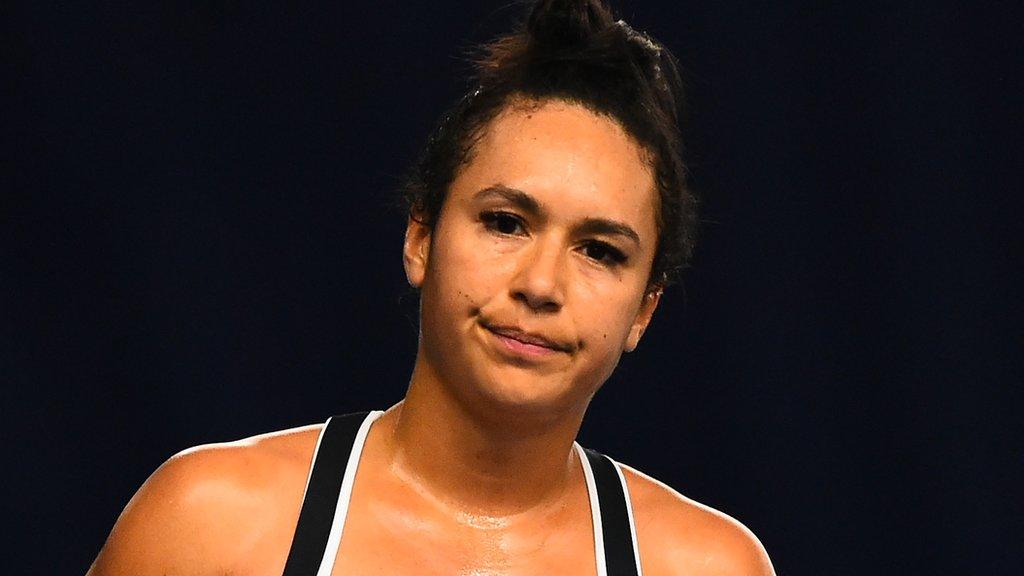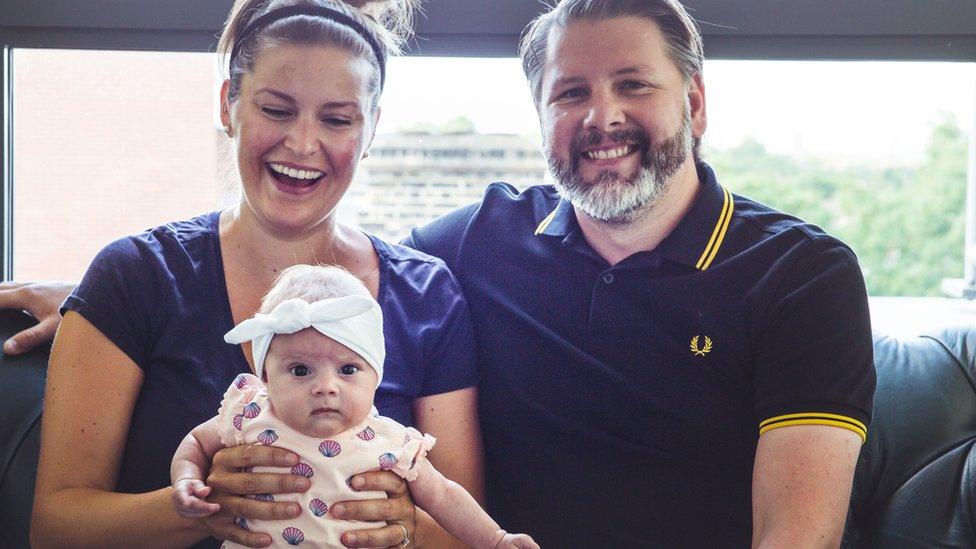Covid: Australian Open player tests positive as event controversy grows
- Published

Australian Open organisers say the tournament will go ahead despite the coronavirus disruption
An Australian Open tennis player has tested positive for Covid-19 amid controversy over cases tied to the event.
At least six infected people are in quarantine in Melbourne, officials say.
The staging of the international event has been debated in Australia given the country's very low virus numbers and strict entry rules.
Players have also expressed frustration about being confined to hotel rooms full-time while many rivals are not.
Organisers say the Grand Slam will go ahead despite the disruptions. The infected player has not been identified publicly.
Since Saturday, at least 72 players - and other staff - have been ordered to stay in their rooms for two weeks without leaving, after arriving on one of three flights with infected travellers.
A total of 15 chartered flights have brought over 1,200 players, staff and officials into Australia for the tournament on 8 February.
Competitors in the Australian Open are having to practise in different circumstances this year
Players confined to their rooms will not be able to train as much as their competitors in the lead-up to the tournament. Top players such as Victoria Azarenka, Sloane Stephens, Kei Nishikori, Angelique Kerber and the UK's Heather Watson are among them.
Some players complained online that they might not have attended had they known the rules. However Tennis Australia insisted they had made the quarantine rules clear.
What rules are the players complaining about?
All players taking part in the competition had to test negative before boarding flights and then be placed in designated Australian Open quarantine hotels in Melbourne and Adelaide.
Players are allowed out for five hours a day to practise on court, but those on the affected flights will not be allowed out of their room at all for 14 days.
Some players said they had not been aware of the rule that everyone on a plane had to isolate if someone on it tested positive.
Yulia Putintseva of Kazakhstan wrote on Twitter: "What I don't understand is that, why no-one ever told us, if one person on board is positive the whole plane need to be isolated... I would think twice before coming here."
Allow X content?
This article contains content provided by X. We ask for your permission before anything is loaded, as they may be using cookies and other technologies. You may want to read X’s cookie policy, external and privacy policy, external before accepting. To view this content choose ‘accept and continue’.

Romanian player Sorana Cirstea wrote on Twitter that she thought she would only have to isolate if someone in her team tested positive, external.
However other players have said that while they're disappointed with the disruption, they had been told the rules and understood Australia's strict conditions.
French player Alize Cornet apologised on Twitter for previously describing the rules as "insane".
Allow X content?
This article contains content provided by X. We ask for your permission before anything is loaded, as they may be using cookies and other technologies. You may want to read X’s cookie policy, external and privacy policy, external before accepting. To view this content choose ‘accept and continue’.
Australian Open director Craig Tiley said he understood the "emotion" from players, but disagreed that the rules were not properly explained.
"We did make it very clear at the beginning. That's why we had the player groups in cohorts. There was always a risk that someone would be positive and have to go into 14 days of isolation," he said.
How did this situation come about?
Tournament organisers negotiated with the Australian government to have the Grand Slam take place this year, amid some debate over whether it should.
They arranged chartered flights for players and their teams to be transported to Melbourne and Adelaide ahead of the tournament. These flights have frustrated many Australians, who have not been able to return home because of travel restrictions during the pandemic.
The first five coronavirus cases connected to the Australian Open were on flights arriving from Los Angeles in the US, Abu Dhabi in the United Arab Emirates (UAE) and Doha, Qatar.
Three people - a crew member, a tennis coach and a member of a broadcast team - tested positive on the flight from Los Angeles on Saturday, while two more were identified on the Abu Dhabi and Doha flights.
Sylvain Bruneau, the coach of 2019 US Open champion Bianca Andreescu, said he was the positive case on the flight from Abu Dhabi. He had tested negative for Covid-19 within 72 hours before the flight's departure.
"I am extremely saddened and sorry for the consequences now on everyone's shoulders sharing my flight," he said in a statement.
How will the players stuck inside prepare?
Georgian tennis player Oksana Kalashnikova said those stuck inside faced a disadvantage, despite Tennis Australia organising deliveries of training equipment and exercise bikes to them.
"The other players will have an advantage because we can't really have the same amount of hours of practice, especially without tennis," she told the Australian Broadcasting Corp.
Several players have posted light-hearted videos on social media of them hitting rallies against their walls, windows and mattresses.
Local media reported that Novak Djokovic - the number one men's player - had suggested players be moved into private homes with tennis courts, or located closer to their coaches on the same hotel floor.
Victoria's Premier Daniel Andrews said the players would not receive any "special treatment".
"People are free to provide lists of demands, but the answer is no," he told reporters on Monday.
State officials said there had already been incidents of people - including one player - breaching the rules by opening their doors to talk to others on their floor.
While most players touched down in Melbourne, superstars including Djokovic, Rafael Nadal, Serena Williams and Naomi Osaka instead flew into Adelaide - across two flights - for an exhibition tournament.
The Australian Open had already been hit by the withdrawal of injured Roger Federer, while three-time major winner Andy Murray tested positive for the virus before departure so did not fly to Australia.
Related topics
- Published16 January 2021

- Attribution
- Published16 January 2021

- Published25 September 2020
